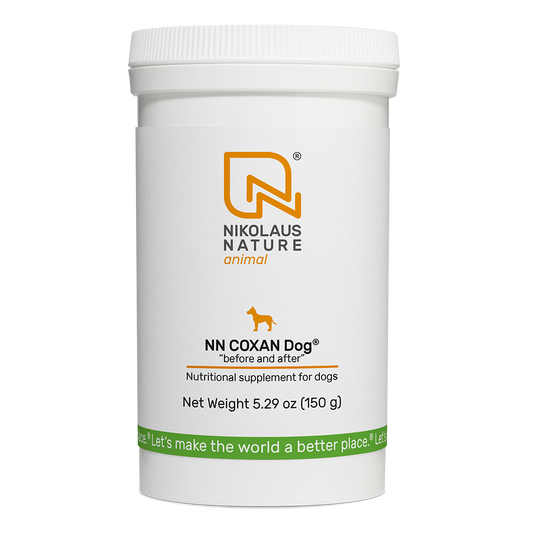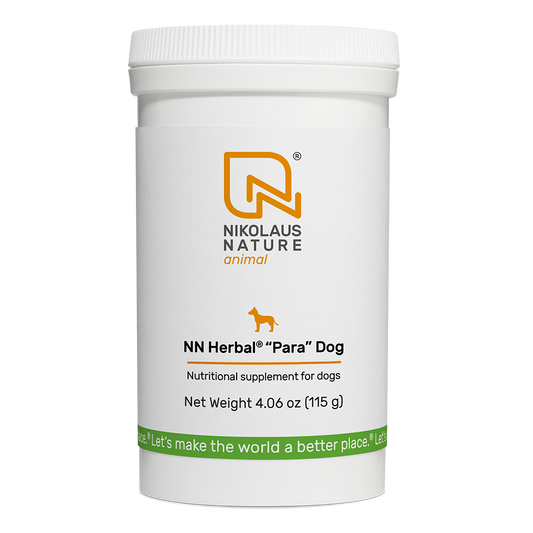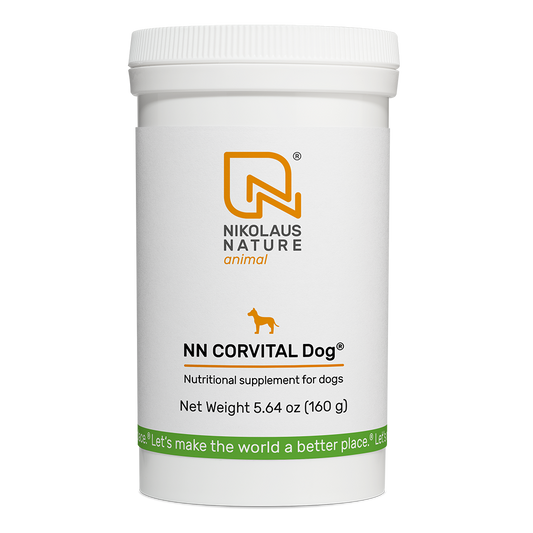Holistic Treatment for Dogs with Allergies
Did you know that up to 10-20% of dogs suffer from allergies? As a dog owner, you may have noticed your dog scratching, licking, or exhibiting other signs of discomfort. In fact, environmental allergies are believed to be the most prevalent type of allergic disease in canines. And it's not just dogs that are affected - up to 30% of people in the United States have allergic reactions to cats and dogs.
Read on to find out how you can help your dog find relief and improve their quality of life with holistic allergy treatments.

What are Dog Allergies?
The overreaction of the immune system to a normally harmless substance is called an allergy and the benign substance is called an allergen. These allergens can come from the environment, food, or even insect bites. When a dog is exposed to an allergen, their body releases histamines and other inflammatory chemicals that cause inflammation and irritation in various parts of the body.
Some breeds are more prone to allergies than others. These include Labrador Retrievers, Golden Retrievers, French Bulldogs, and West Highland White Terriers.
Do you know? Allergies can develop at any age, but they often appear in dogs between 6 months to 3 years old.
Types of Allergies
Dogs can suffer from several types of allergies. The most common types are discussed below:
Environmental Allergies (Atopy)
This is one of the most common types of allergies in dogs. They are triggered by allergens found in a dog's surroundings, such as pollen, mold spores, dust mites, and grass. Dogs with environmental allergies often experience seasonal symptoms, but indoor allergens can also cause year-round issues.
Food Allergies
Food allergies are less common than environmental allergies, but can still cause severe reactions to dogs. Common foods include proteins like beef, chicken, dairy, or wheat. Signs of food allergies range from itchy skin, ear infections, gastrointestinal upset, or even chronic diarrhea.
Flea Allergy Dermatitis
This allergy is not to the fleas themselves but to the flea saliva. Even a single flea bite can trigger an intense allergic reaction in sensitive dogs. It's a very common cause of skin irritation and itching in dogs during warmer months.
A dog with flea allergy dermatitis develops hot spots (moist, inflamed patches of dry skin) and chews or scratches excessively at the base of the tail or along the back.
Contact Allergies
These allergies are triggered by direct contact with an allergen. They can be caused by various substances, including certain metals, plastics, fabric, cleaning products, chemicals in topical flea/tick treatments, or even chemicals used to treat grass or lawns.
Common Signs
Dog allergy symptoms can vary according to the severity and type of the allergy, but some of the most common signs include:
- Itchy skin (pruritus)
- Skin rashes and hives
- Chronic ear infections
- Runny nose and watery eyes
- Sneezing
- Paw chewing/licking
- Digestive issues
- Hair loss and bald patches
- Hot spots
- Breathing difficulties
What is Holistic Allergy Treatment in Dogs?
Holistic allergy treatment is an approach that treats the entire animal - body, mind, and environment. Not just treating the symptoms.
The philosophy of holistic treatment is that the dog's body is pretty amazing at healing itself and holistic treatments give it a helping hand. This involves natural remedies and lifestyle changes to manage and alleviate allergy symptoms without using conventional medications.
Traditional veterinary medicines often rely on steroids, antihistamines, and antibiotics. These medications can provide relief, but they may have side effects.
Now, don't expect miracles overnight. Holistic care takes time and some trial and error. What works for one may not work for another dog. That's why it's important to team up with a holistic veterinarian who can create a treatment plan only for your dog. It is also important to remember that some pets will not respond to holistic treatment.
The Best Holistic Treatment For Dog Allergies
Bovine Colostrum
Bovine Colostrum is the first milk produced by cows after giving birth. It contains vital compounds that can help manage dog allergies. This nutrient-rich substance includes antibodies that cows develop against common allergens and infectious agents.
When this colostrum is given to dogs, they benefit from these pre-formed antibodies. It help their immune systems recognize these substances as harmless.
The key component in colostrum is proline-rich polypeptide (PRP). It plays an important role in modulating the immune response. PRP inhibits the immune cells that are responsible for triggering allergic reactions in dog bodies.
It also increases the production of suppressor T-cells and helper T-cells. These cells help regulate the immune system's response to allergens.
Want to give it a try?
To use colostrum for your dog's allergies, you can give it in powder or capsule form. For best results, administer it on an empty stomach. Small dogs typically need one capsule a day, while larger breeds may need two. For powdered colostrum, use 1/8 teaspoon twice daily for every 25 pounds of your dog's weight.
Omega-3 Fatty Acids
Did you know there's a secret weapon hiding in your kitchen that could help your dog fight allergies? It's omega-3 fatty acids, and they're not just good for humans – they're amazing for our dogs too!
Omega-3 fatty acids are a highly effective natural remedy for improving dog allergies. The key omega-3s for allergy relief are ETA, EPA, and SDA. These fatty acids target the root cause of allergic reactions. They block the inflammatory chemicals called leukotrienes and prostaglandins in your dog's system.
You'll find these beneficial omega-3s in several sources like green-lipped mussel oil (which contains both ETA and EPA), hemp seed oil (which offers SDA), and ahiflower oil (another excellent source of SDA)
Several studies have shown the benefits of omega-3 supplementation for dogs with allergies. One randomized, double-blind trial found that dogs receiving antioxidants, polyphenols, and omega-3 supplements experienced a 46% reduction in allergy symptoms compared to the placebo group.
Another study showed that omega-3s were as effective as prescription antihistamines in alleviating allergic dermatitis in dogs.
Digestive Enzymes and Probiotics
Digestive enzymes break down the complex nutrients in your dog's food and help optimize nutrient absorption, reduce inflammation, and alleviate digestive issues. Some special enzymes like bromelain from pineapples and papain from papayas are beneficial. They reduce the amount of irritation that your dogs experience during allergic reactions. These enzymes increase the effectiveness of probiotics when added as a supplement to the dog’s diet.
Now, let's talk about probiotics. They are live microorganisms that have health benefits for the host. Probiotics are studied for their ability to improve digestion, reduce inflammation, and alleviate symptoms of allergies in dogs.
Some of the most effective probiotic strains for dogs include:
- Bifidobacterium animalis
- Lactobacillus acidophilus
- Enterococcus faecium
Probiotics can be found in a variety of foods and supplements like pickles, sauerkraut, kefir, honey, bananas, and yogurt. They can also be administered as supplements, either through food or capsules.
Apple Cider Vinegar Rinse
Apple cider vinegar (ACV) balances skin pH and helps with skin irritation. Here's how to use ACV for your dog:
- Full-body rinse: One of the most effective ways to use ACV for dog allergies is through a topical rinse or sprays. If your dog is experiencing itching all over, consider a full-body rinse after shampooing. Combine ½ cup ACV, 1⁄2 cup cooked and cooled green tea, and 1 cup filtered water, then pour the mixture over your dog and pat dry.
- Foot bath: You can prepare an ACV foot bath by mixing one part ACV with two parts water in a bowl or bucket. Soak your dog's paws for up to five minutes each. Then dry them thoroughly without rinsing.
- When taken internally, the acetic acid in ACV can help balance the pH of the body. Always mix ACV into your dog's food or water, and never give it to them undiluted. It's best to start with small doses, such as 1 teaspoon per 15 pounds of body weight. This can be done once or twice daily.
Important Note: Do not apply ACV to open wounds or raw skin, as the acidity can cause stinging and further irritation. It's also recommended to do a patch test first to ensure your dog doesn't have any adverse reactions to the vinegar.
Coconut Oil
Coconut oil contains lauric acid. It's a medium-chain triglyceride (MCT) that has potent antibacterial, anti-inflammatory, and antifungal properties. You can apply coconut oil topically to the affected areas to soothe and heal skin irritations. This method is effective for soothing skin allergies, hotspots, and wounds. Simply warm the oil in your hands and apply it to the affected area. Just wait for a few minutes before wiping it off. Do not allow your dog to lick it off.
Coconut oil can also be added to a dog's diet to help manage allergies. It can be mixed with their food or given as a supplement. The lauric acid in coconut oil helps to boost the immune system. Start by adding a small amount (1 teaspoon per 10 pounds of body weight) and gradually increase the dosage as needed.
Aloe Vera
Aloe vera is another natural and effective option for dog allergies. It is known for its soothing and healing properties. Aloe vera gel can be applied topically to the affected areas to soothe and heal skin irritations.
Simply apply a small amount of aloe vera gel to the affected area. This process helps to deeply moisturize the skin and promote rapid healing.
Local Raw Honey
When we talk about raw honey, we mean honey that is not heated, pasteurized, or processed in any way. This is important because raw honey retains all its natural goodness and pasteurized honey loses many of its beneficial properties during processing.
Now, you might be wondering how honey helps with allergies. Well, it's pretty clever! Local raw honey contains small amounts of pollen from plants in your area. When your dog consumes this honey, they're exposed to these allergens in tiny, manageable doses. Over time, this helps their immune system build up a tolerance to these allergens. It's kind of like giving your dog a natural, tasty version of allergy shots!
But that's not all - raw honey is packed with other benefits too. It's alkaline-forming, which is great for your dog's overall health. It's also loaded with natural vitamins, enzymes, and powerful antioxidants. These nutrients get destroyed when honey is pasteurized, which is why raw honey is so special.
Raw honey is also a powerhouse when it comes to fighting off microorganisms. It has anti-bacterial, anti-viral, and anti-fungal properties. This means it can help boost your dog's immune system and fight off infections.
For seasonal allergies, a daily dose of local raw honey could be just what the veterinarian recommends. A spoonful a day helps prevent future allergies and provides some much-needed relief. Just remember, consistency is key - it may take some time for you to see the full benefits.
Oatmeal Baths
Oatmeal baths work wonders for dogs with allergies and itchy skin. Oatmeal contains special compounds like avenanthramides that reduce inflammation and soothe irritation. When used in a bath, it forms a protective layer on the skin to lock in moisture.
Here's how to do it: Grind plain oatmeal into a fine powder. Add it to warm bath water. Use 1/3 cup for small dogs or 1/2 cup for larger breeds. You can also add olive oil or high-fat milk for extra moisture. Let your dog soak for 10-15 minutes, then rinse well. This bath gives quick relief and helps prevent future itching.
Baking Soda
Baking soda is a handy item, commonly found in your kitchen. It's great for more than just cooking - it can help your dog too! Baking soda soothes and calms irritated skin. This makes it perfect for dogs with allergies.
You can use baking soda as a dry shampoo for your dog. It soaks up extra oil from their coat and helps reduce shedding. Dogs with skin problems like eczema or hot spots will especially benefit from this.
Baking soda also kills bacteria and fungi naturally. This means it can help heal infections. If your dog has an ear or skin infection, try using baking soda on the affected area. It will help clear up the infection and reduce swelling.
One simple yet effective method is creating a baking soda paste. Mix one tablespoon of baking soda with a little water and stir it until it looks like a thick toothpaste. Now, put this paste on your dog's itchy spots and spread it on red or irritated skin.
For dogs with itchy paws, gently rub the paste between their toes and on top of their feet. Leave it on for a few hours before gently washing it off. Be gentle as you rinse. This method is easy and often helps soothe your dog's skin.
Chamomile
Chamomile is a powerful herb that helps dogs with allergies. People have used it for hundreds of years to treat many health problems in dogs.
This herb has anti-inflammatory and antiseptic properties. It reduces swelling and stops itching caused by allergies. Some studies report that chamomile helps decrease histamine production, which is often overactive in dogs with allergies. You can put chamomile directly on your dog's skin to give quick relief.
Here are some ways to use chamomile:
- Make a chamomile compress for eye irritation.
- Use a chamomile rinse after bathing to soothe itchy skin.
- Add chamomile tea or tincture to your dog's food.
Before using chamomile, test it on a small area of your dog's skin. Some dogs might be allergic to chamomile itself, particularly those with sensitivities to plants in the Asteraceae family. If you see any adverse reactions, stop using it right away.
Note: Be careful when using chamomile for pregnant or nursing dogs as its effects on developing fetuses and nursing puppies are not fully understood.
Nettle: Nature's Antihistamine for Allergy Relief
Nettle is a plant known scientifically as Urtica dioica L. This plant contains alkaloids, carbonic acid, acetylcholine, and 5-hydroxytryptamine. These compounds act as natural antihistamines and help reduce the body's response to allergens.
Nettle is effective in relieving seasonal allergies. Nettle also contains calcium, iron, and silica. These are essential nutrients that support overall health and immune function.
Nettle can be taken in various forms like dried herb, tincture, tea, and wash. The dried herb can be given orally, while the tincture and tea can be used as a supplement. The wash can be applied topically to the skin to provide relief from itching and inflammation.
Nettle is a natural and non-invasive treatment for allergies in dogs.
Furthermore, nettle is easily available in many parts of the world and can be grown easily. This makes it a cost-effective option for dog owners.
Mushrooms
Mushrooms contain high levels of beta-glucans. These beta-glucans have immune-modulating properties means they bind to specific immune cells, alter their response, and help to prevent inflammation and allergic reactions.
Some mushroom varieties particularly rich in beta-glucans include Reishi, Shiitake, Cordyceps, Turkey Tail, and Maitake. When giving mushrooms to your dog, it's important to cook or dehydrate them first. Never feed raw mushrooms to your pet.
For a medium-sized dog, give 400 to 500 mg of mushrooms once or twice daily. When purchasing medicinal mushrooms, look for products with a certificate of analysis showing at least 30% beta-glucan content.
Avoid products with high starch content. Too much starch means the beta-glucans might come from grains, not mushrooms.
Quercetin
Quercetin is a natural remedy that has gained popularity in recent years for its ability to treat allergy symptoms in dogs. It is also known as "Nature's Benadryl," because it is a bioflavonoid that is derived from various plants, including fruits, and vegetables.
It reduces the release of histamine by mast cells. That is a key component of allergic reactions in dogs. It also has anti-inflammatory properties, which help to reduce swelling and itching further.
Quercetin also inhibits the production of leukotrienes – a type of lipid that contributes to bronchoconstriction in dogs with asthma.
Quercetin is often combined with other enzymes, such as bromelain and papain, to increase its effectiveness. While it can be beneficial for many dogs, it's important to note that it's not suitable for all. Pregnant dogs, those undergoing chemotherapy, or dogs taking certain medications like anticoagulants or steroids should not use quercetin without first consulting a veterinarian.
You can give your dog quercetin as a supplement or by adding quercetin-rich foods to their diet. The amount depends on how big your dog is. A good rule of thumb is 50-100mg for every 10 pounds of your dog's weight. It's best to split this into two doses - one in the morning and one at night – to keep the quercetin working all day long.
Licorice Root: Anti-Inflammatory Aid for Allergies
Licorice root offers a natural approach to managing allergies in dogs. The key active compound in licorice root is glycyrrhizin. Its chemical structure is similar to natural corticosteroids. This allows licorice root to act as an anti-inflammatory without the negative side effects that mostly come with steroid medications.
Licorice root can be used as an ointment, oil infusion, or tea to control the discomfort of conditions like eczema, psoriasis, and flea-bite allergies.
When it comes to dosing, licorice root is generally well-tolerated by dogs and has a naturally sweet taste that makes it easy to administer. Tinctures are a common form, with a starting dose of 12-20 drops/20 lbs of body weight – given twice daily. Licorice root tea can also be an effective option. Use 30-60 drops/20 lbs – twice daily.
However, licorice may not be suitable for all dogs. Those with high blood pressure, heart disease, or kidney issues should avoid it. Pregnant or nursing dogs should also not use this herb. As with any supplement, consult a veterinarian before using it, especially for long-term treatment plans.
Other Therapies for Dog Allergies
In addition to the remedies and dog health supplements discussed above, several other holistic therapies can help manage dog allergies and improve overall well-being.
Acupuncture
Acupuncture is a traditional Chinese medicine practice. It involves inserting of thin needles into specific points on the body. That stimulates energy flow and promotes healing. While it may seem unconventional, acupuncture is effective in reducing allergy symptoms in dogs. Acupuncture can improve blood flow and lymphatic drainage, which can help to remove toxins and allergens from the body.
Acupuncture is a safe and effective treatment for dog allergies, and it can be used in conjunction with other holistic therapies or conventional medications.
Calming Massage
Massage does not directly stop the root cause of allergies but it can manage your dog's stress and anxiety levels. When you massage your dog, it might feel more relaxed and show fewer allergy symptoms.
You can learn to perform simple massage techniques at home or take your dog to a professional canine massage therapist.
How To Manage Dog Allergies Holistically?
Holistic management of dog allergies involves a multi-faceted approach. Here are some additional strategies to consider:
Avoid High-Carb Ingredients
Do you know, you can manage dog allergies holistically right from their food bowl? Too many carbs can make allergies worse. When dogs eat lots of carbs, they turn into sugar in their bodies. This sugar feeds yeast and bacteria, which can lead to itchy skin and infections.
Instead, feed your pup more protein and good fats like lamb, salmon, and coconut oil. These foods help fight allergies from the inside out. Avoid grains like wheat, corn, and soy – which are common allergens.
Wipe Down Paws and Coat After Walks
A simple way to help your dog's allergies is to wipe down their paws and coat after walks or outdoor time. A damp cloth or pet-friendly wipes can gently remove allergens like pollen and dust that collect between their paw pads.
For dogs with sensitive skin, a quick foot soak in cool water with a small amount of apple cider vinegar can soothe irritation and help fight off germs. This regular routine not only keeps allergens out of your home but also gives you a chance to check for any signs of irritation or injury on the paws.
Preventing Allergies in Dogs: The Best Medicine
As the old saying goes, "Prevention is better than cure." This holds particularly true for dog allergies. By taking these steps you can minimize your dog's exposure to allergens and strengthen their immune system.
- Maintain year-round flea and tick control to prevent allergic reactions to flea bites
- Wash your dog's bedding regularly to eliminate accumulated allergens, including their blankets, pillows, and crates.
- Groom your dog consistently, including brushing, bathing, and trimming their coat.
- Reduce exposure to common allergens, such as pollen, dust, and mold.
- Keep your home clean by vacuuming often, using air purifiers, and keeping windows closed during high pollen times.
- Keep your yard free of weeds, tall grass, and other plants that can trigger allergic reactions.

FAQ about Holistic Treatment for Dogs with Allergies
What essential oils are good for dogs with allergies?
Essential oils like lavender, chamomile, and peppermint can help soothe allergy symptoms in dogs, such as itching and inflammation. However, it's important to use these oils safely and under the guidance of a veterinarian, as some essential oils can be toxic to dogs if used improperly or ingested.
Can holistic and conventional treatments be used together for dog allergies?
Yes, holistic and conventional treatments can often be used together to manage dog allergies. Many veterinarians recommend both approaches, using conventional medications to provide immediate relief while also using holistic therapies to address the underlying causes.
Can stress and anxiety affect my dog’s allergies?
Yes, stress and anxiety can elevate allergy symptoms in dogs by weakening the immune system and increasing inflammation. Chronic stress can make dogs more susceptible to allergic reactions and slow down healing processes. By implementing stress-reduction techniques, such as regular exercise, calming supplements, or behavior modification, you can help manage both stress and allergy symptoms.
What if my dog has side effects from a holistic allergy treatment?
If your dog experiences any adverse reactions from a holistic allergy treatment, discontinue use immediately and consult your veterinarian. Not all holistic therapies are suitable for every dog, and it's important to monitor your pet closely and make adjustments as needed. Your veterinarian can help you find an alternative holistic approach or recommend conventional treatments if necessary.
Sources:
-
Dog and Cat Allergies: Current State of Diagnostic Approaches and Challenges,
https://www.ncbi.nlm.nih.gov/pmc/articles/PMC5809771/ -
Facts About Pet Allergies,
https://www.filtrete.com/3M/en_US/filtrete/home-tips/full-story/~/7-suprising-facts-about-pet-allergies/?storyid=974e37a7-71ff-464c-969c-9539d365ce49 -
Supplementation of diets with bovine colostrum influences immune function in dogs,
https://pubmed.ncbi.nlm.nih.gov/23773360/ -
double-blind, placebo-controlled clinical trial measuring the effect of a dietetic food on dermatologic scoring and pruritus in dogs with atopic dermatitis,
https://pubmed.ncbi.nlm.nih.gov/34798876/ -
Effect of omega-3 fatty acids on canine atopic dermatitis,
https://pubmed.ncbi.nlm.nih.gov/15206474/ -
Microbiota and probiotics in canine and feline welfare,
https://www.ncbi.nlm.nih.gov/pmc/articles/PMC7111060/ -
Oral Administration of Compound Probiotics Improved Canine Feed Intake, Weight Gain, Immunity and Intestinal Microbiota,
https://www.ncbi.nlm.nih.gov/pmc/articles/PMC6454072/ -
The Effects of Four Acidifying Sprays, Vinegar, and Water on Canine Cutaneous pH Levels,
https://www.researchgate.net/publication/10931404_The_Effects_of_Four_Acidifying_Sprays_Vinegar_and_Water_on_Canine_Cutaneous_pH_Levels -
Avenanthramide,
https://www.sciencedirect.com/topics/agricultural-and-biological-sciences/avenanthramide -
A Comprehensive Study of Therapeutic Applications of Chamomile,
https://www.ncbi.nlm.nih.gov/pmc/articles/PMC9611340/ -
Efficacy of Supportive Therapy of Allergic Rhinitis by Stinging Nettle,
https://www.ncbi.nlm.nih.gov/pmc/articles/PMC5963652/ -
β-Glucans in the treatment and prevention of allergic diseases,
https://pubmed.ncbi.nlm.nih.gov/23253683/ -
Acupuncture treatment for a dog with allergy,
https://hrcak.srce.hr/file/370904 -
Quercetin for dogs,
https://www.researchgate.net/publication/340998452_Beynen_AC_2020_Quercetin_for_dogs







